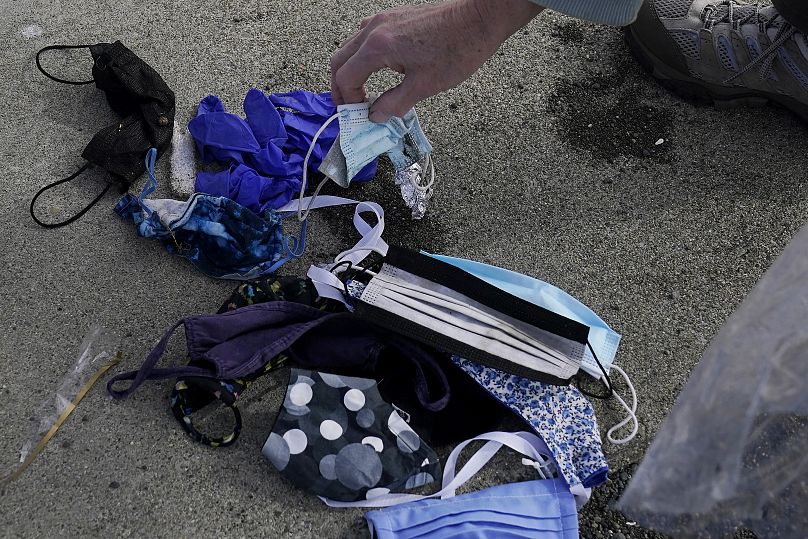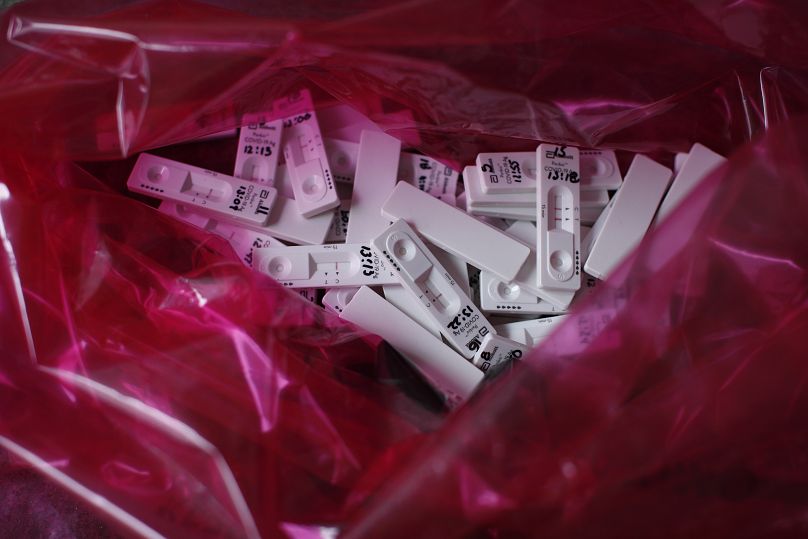Old tests are being repurposed into sparkly jewellery, plant pot labels and more, but not all of our pandemic plastics are necessary.
An image has been doing the rounds on social media, as funny pics are wont to do. It shows a lateral flow test bedazzled as a glittering, sequined earring.
It’s an amusing repurposing of something that has become so ubiquitous in our lives and, in many places, is a necessary accessory for a night out. But, unlike with a positive COVID case, it’s unlikely to catch on as a trend.
More’s the pity: we’re throwing away around 10g of plastic with every lateral flow test. If every adult and secondary school student in the UK did two tests a week, it would produce more than 1,000 tonnes of rubbish every week, according to one environmental campaigner.
We swim through a world of COVID plastics - from disposable masks to test kits, hospital gowns, visors, vaccine syringes, sanitiser bottles and more. What will become of it all when the wave of restrictions subsides?
What is ‘hygiene theatre’ and why should it be stopped?
Though it’s a backwards step from the progress we were making against single-use plastics before the pandemic, COVID plastics are undoubtedly necessary. The versatile material has a huge range of medical uses that we literally couldn’t live without.
But there’s a feeling that plastic might have gone too far in some settings - on laminated restaurant menus, for instance, or the over-erection of plexiglass barriers in pubs. ‘Hygiene theatre’ is the phrase for this performative rather than useful stuff, and you can see it spiking as a Google search term after UK lockdowns.
The ease with which we discard disposable masks after just one short use could come under this category too.
Around 53 million masks are thrown away in the UK each day, a waste company estimated in 2020. Hopefully some of these have now been replaced by responsibly-sourced reusable ones, a booming business two years on.
But the sight of masks blowing along the pavement, or trampled into the undergrowth, is still commonplace. These littered masks pose the biggest environmental danger - getting into our waterways, and entering the plastic soup mix in the ocean.
Where can you recycle COVID masks?
A number of places have launched mask-recycling schemes so you needn’t send them to landfill either. Highstreet store Wilko was one of the first to introduce recycling points in the UK, and is extending them until the start of April following a “surge” in customer demand.
Once full, these bins are taken away by recycling specialists ReWorked and broken down into raw fibres which can be refashioned into other safety materials, building blocks and even good quality, durable public space furniture.
The home and garden retailer estimates that 400,000 masks could be recycled via the scheme, diverting around 966kg of single-use plastic.
Alternatively, you can order your own PPE recycling box from ReWorked which they will regularly empty for you as part of their #ReclaimTheMask campaign.
Quirky ways to reuse your COVID plastics
If you fancy using your COVID masks for some arts and crafts first, the resourceful people of Pinterest have got you covered. Users have been sharing YouTube videos showing how to make scrunchies, little pouches and bouquets of blue and white flowers.
Lateral flow testing kits are more challenging to repurpose, but there’s still possibilities here too, beyond COVID-chic 80s-esque jewellery.
In a post shared hundreds of times on Facebook, one woman revealed how she has deconstructed the antigen test cassettes to use as markers in plant pots and beds - earning praise from other green-fingered users.
It’s worth taking care with these as they will have a small amount of the extraction buffer liquid on them, but the components should be in such negligible quantities that they’re safe to use.
Positive tests, needless to say, should be disposed of in the waste bag with the swab.
But the extraction buffer holder can be recycled, and the little packets of desiccant that come in the kit could be set aside for one particular, handy use: if you empty them all out into a bag, they’re even better than rice for drying out a wet phone.
Targeting unnecessary plastics
The problem of COVID plastic waste is generating some clever solutions around the world. One enterprising group of teachers and students at IOWA State University challenged themselves to re-purpose plexiglass barriers. They found the acrylic is cuttable and pliable under heat, making it ideal for designing educational equipment like brochure holders, desktop organisers and adjustable desks.
Dismantling ‘hygiene theatre’ is one thing, but it’s clear that most PPE is here to stay until a better solution comes along. Rather than despair at this mounting waste, we could use it as a spur to refocus our efforts on eliminating other single-use plastics - ones that aren’t so vital.
Did you know, for example, that the UK uses 11 billion wet wipes a year, with 90 per cent of those containing plastic? MP Fleur Anderson is proposing a new law to ban this variety, scheduled for a second reading in the House of Commons on 4 February 2022.
Yorkshire Water is backing the ban, and with good reason: 45 per cent of the blockages it removed from the sewer network last year were down to wet wipes being incorrectly flushed down toilets.
If cutting down on the mammoth amount of single-use plastics we use is a cause you want to get behind, there’s plenty of places to start.
Do you have any other fun or practical uses for COVID plastics? Let us know on Instagram or Twitter.













